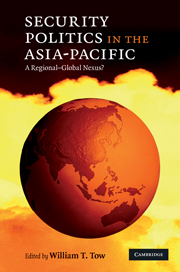Book contents
- Frontmatter
- Contents
- List of illustrations
- About the contributors
- Preface
- Acknowledgements
- List of abbreviations
- 1 Setting the context
- Part I
- Part II
- 6 Hegemony, hierarchy and order
- 7 Democracy and security in East Asia
- 8 Security community-building in the Asia-Pacific
- 9 Human security and global governance
- 10 The economics–security nexus in the Asia-Pacific region
- Part III
- Part IV
- References
- Index
10 - The economics–security nexus in the Asia-Pacific region
Published online by Cambridge University Press: 05 June 2012
- Frontmatter
- Contents
- List of illustrations
- About the contributors
- Preface
- Acknowledgements
- List of abbreviations
- 1 Setting the context
- Part I
- Part II
- 6 Hegemony, hierarchy and order
- 7 Democracy and security in East Asia
- 8 Security community-building in the Asia-Pacific
- 9 Human security and global governance
- 10 The economics–security nexus in the Asia-Pacific region
- Part III
- Part IV
- References
- Index
Summary
The rise of China and India poses new challenges for the management of economic and security relations in the Asia-Pacific region. Writers in the realist tradition (for instance, Gilpin 1981; Levy 1983; Mearsheimer 2001) identify power transitions as the periods in which the international system historically has been most prone to major international conflict. Rising powers frequently are impatient with the role and status afforded them in the existing system. Existing great powers seldom succeed in fashioning an appropriate response that satisfies the new challengers. For realists, even in the absence of systemic wars, power transitions may still have a significant negative impact on global welfare because of the relationship they assume to exist between the distribution of power and economic openness – a relationship summarised as hegemonic stability. For realists, the Great Depression of the 1930s represents the classic example of economic costs arising from power transition and the absence in the international system of a single hegemonic power (Kindleberger 1973).
Accordingly, the common assumption in much of the contemporary literature is that rapid economic growth and the emergence of new economic giants will inevitably lead to conflict – in a worst case scenario, to military confrontation. In an anarchical environment, states are unable to learn the lessons of history, and governments are doomed to repeat the mistakes of their predecessors (Schweller 1999).
- Type
- Chapter
- Information
- Security Politics in the Asia-PacificA Regional-Global Nexus?, pp. 188 - 208Publisher: Cambridge University PressPrint publication year: 2009
- 10
- Cited by



